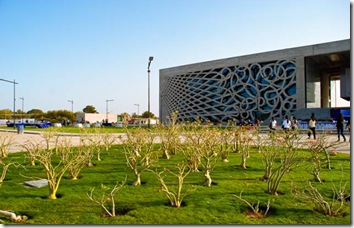
The High Court of Gujarat on Friday reversed most of its October 2012 decision that had favoured five GNLU Gandhinagar students who were forced to repeat a year at the university, however, it agreed with the earlier ruling that unexplained “goodness marks” required by the university to pass a year were illegal.
Five GNLU students had last year challenged the university’s examination rules, which stipulated that in order to advance from the third year, they needed to have passed all previous exams.
Re-takes of any so-called “backlog” failed exam papers by students detained after the third year would at times only be possible at the same time as when junior students would take their exams. This could mean that detainees would not be allowed to attend classes or proceed for up to one year.
Those rules were clearly notified to students for the first time around July 2011, at which point the administration had provided some students with a one-year grace period to clear backlog papers.
The third- and fourth-year-students challenged this action and the rules’ validity in the Gujarat HC in August 2012, also targeting the rule requiring all students to secure two marks for non-academic “goodness” to pass each subject, and another that slashed the maximum time in which to graduate from the university from eight to seven years.
It is understood that up to five so-called “goodness” marks, which were earlier known as a disciplinary score, would be awarded by each subject teacher to his or her students at the end of each semester for general classroom participation, discipline and lack therof.
Justice KS Jhaveri had accepted the petitioners’ challenges on 17 October 2012 and directed GNLU to permit the petitioners to attempt their backlog papers in order to be promoted to the next year. Jhaveri also ruled that the 2011 rules should be considered by GNLU’s general council, and that such rules should not apply to students who had failed papers before July 2011.
GNLU filed a letters patent appeal against Jhaveri’s decision, which was admitted by the division bench of chief Justice Bhaskar Bhattacharya and Justice JB Pardiwala on 8 November 2012.
Yesterday the division bench set aside most of Jhaveri’s directions, holding:
“[…] while interpreting the rule in the matter of education, it was not proper on the part of the learned Single Judge to re-frame the Rules which have been approved by the Executive Council and General Council while interpreting the same.
“The petitioners having taken advantage of the re-evaluation, re-test and allocation of proportionate marks allotted to them in a mid-semester on the basis of learning through assistance, moot courts and memorial submissions, it is now not open to the writ-petitioners to challenge those Rules only after failing in the examination. […]”
However, the bench agreed with Jhaveri’s quashing of the “goodness marks” rule:
“We […] find substance in the contention […] that 2 marks given for ‘goodness’ cannot be held to be justified without making any guidelines for giving such marks when such 2 marks is compulsory for success.
“In the cases before us […] no student has been detained for such ‘goodness’ marks. Be that as it may, we approve that part of the findings of the learned Single Judge where the learned Single Judge has rightly declared the provisions for giving ‘goodness’ marks as illegal in the absence of any guidelines for awarding such marks. Authorities of the appellant GNLU will frame appropriate guidelines for allocation of such marks if it intends to maintain the same in the Examination Rules…”
Pushkar Santoshkumar, who was one of the petitioners, told Legally India that he and the other petitioners were in the process of finalising a Supreme Court advocate through whom they would immediately approach the apex court. He said he did not find the order of the chief justice to be “reasoned”.
He added that many issues validly raised in the petition and dealt with by Jhaveri were not dealt with by the division bench.
Santoshkumar and the other petitioners are currently residing in GNLU’s hostels, although they have not yet been allowed to attend classes in the first semesters of their fourth and fifth-years that began in June 2012.
Santoshkumar had also submitted a petition signed by 400 GNLU students, to a statutory review commission of Dr NR Madhava Menon, Dr Bakul Dholakia and Dr HC Dholakia formed last year, raising issues around malfunctioning of the university and alleging, according to the Times of India, the prevalence of so-called “backdoor” admissions.
GNLU director Bimal Patel declined to comment when contacted.
threads most popular
thread most upvoted
comment newest
first oldest
first
Can you please try again? Have made some changes that should make the site slightly more viewable in IE, though it's still possibly a bit ugly...
Please do let me know if it's better or some things are still unreadable...
Best wishes,
Kian
good day :D
threads most popular
thread most upvoted
comment newest
first oldest
first